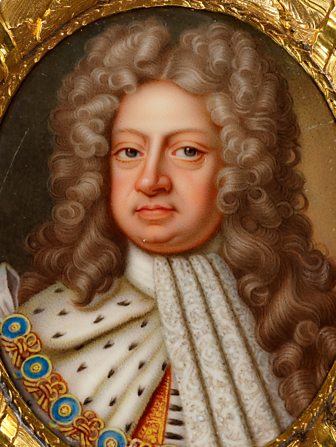King George I
In 1660, a baby was born in Germany. Quiet, unassuming, with rather bulging blue eyes, he would grow up to become Georg Ludwig, Elector (or ruler) of the dinky little German state of Hanover.
would have hardly troubled the pages of our history books had it not been for the horrible medical history of , who died in 1714 with no surviving children, despite having endured seventeen pregnancies.

George I was perhaps the quietest, least exciting king that Britain has ever had, but he was by no means the worstLucy Worsley
Her death left Britain kingless, and Parliament had to look around for a relation of Anne’s to take her place. Inconveniently, many of her nearest relatives were Catholic, so they eventually alighted upon the Protestant line of the . Georg Ludwig was the grandson of and therefore had some royal blood. So he was invited over to become king of Britain. Unfortunately, as his English was weak, he could hardly understand his coronation service.
Aged 54, the new king George I was not entirely delighted to have become a king. A shy, retiring man, his gossipy and somewhat xenophobic new courtiers spread evil rumours about their new German boss. He ‘rejects no woman’, the snide Lord Chesterfield said, ‘so long as she is very willing, very fat, and has great breasts’. In reality, this was anti-German xenophobia. The king lived almost respectably with his single, rather skinny mistress. His courtiers liked to believe that he had two of them, the fat one, and the thin one, the ‘Elephant’, and the ‘Maypole’, but in fact the ‘Elephant’ was the king’s illegitimate half-sister. There was, however, a genuine sexual scandal in George’s past: .
Once in Britain, George made efforts to learn the language and ways of his new people, and he showed a steely side when he put down a rebellion in 1715. George I wasn’t a showy, charismatic king, but he wasn’t a bad one either. His weakest spot was the very poor relationship he had with his son, the future George II. But even the family feuding that beset this new Hanoverian royal family presented their subjects with enjoyable gossip, as it was all reported in the newspapers.
George I was perhaps the quietest, least exciting king that Britain has ever had, but he was by no means the worst. In 1714, the 300th anniversary of his succession, he’s at last getting a bit more of the attention he deserves.
"The Turnip King"

The Turnip King
Lucy Worsley describes what the people of London really thought of George I.





